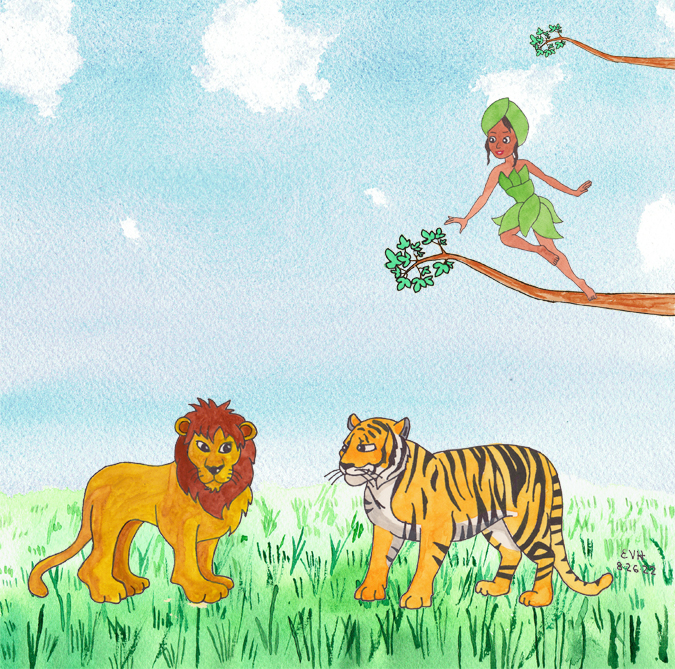
Jataka 361
Vaṇṇāroha Jātaka
The Jackal’s Slander
as told by Eric Van Horn
originally translated by H.T. Francis and R.A. Neil, Cambridge University
originally edited by Professor Edward Byles Cowell, Cambridge University
The importance of friendship is a theme that is emphasized repeatedly in the Buddhist texts. We take on the form of the people with whom we spend time. Buddhist monks and nuns are (or tend to be!) good companions in life. It is extremely important to examine critically and wisely the qualities of our friends and companions. How they are will be very much how we are.
“Is it so, Sudātha?” The Master told this story while he was at Jetavana. It is about the two chief disciples (Sāriputta and Moggallāna). On one occasion the two chief elders decided to devote themselves to solitude during the rainy season. So they bid the Master farewell, and leaving the company of the Saṇgha, they left Jetavana. They carried their bowls and robes with their own hands and went to live in a forest near a border village.
There was a man there who waited on the elders. He ate their leftover food, living separately from them but in the same area. On seeing how happily these elders lived together, he thought, “I wonder if it is possible to set them at odds against each other.” So he went to Sāriputta and said, “Can it be, Reverend Sir, that there is some quarrel between you and the venerable chief elder Moggallāna?”
“Why do you ask, sir?” he asked.
“He speaks critically about you. He says, ‘When I am gone, what is Sāriputta worth compared with me in caste, lineage, family and country, or in the power of attainments in the holy texts?’”
The elder smiled and said, “Go away, sir!”
Another day he went to the chief elder Moggallāna, and said the same thing. He too smiled and said, “Go away, sir!”
Moggallāna went to Sāriputta and asked, “Has this fellow who lives on our leftovers said anything to you?”
“Yes, friend, he has.”
“And he said exactly the same thing to me. We must send him away.”
“Very well, friend, send him away.”
The elder said to the man, “You are not to come here.” And snapping his fingers at him, he sent him away.
And thereafter, the two elders lived happily together.
After returning to the Master, they paid homage to him, and then they sat down. The Master spoke kindly to them and asked if they had kept their retreat pleasantly. They said, “A certain beggar wished to set us at odds against each other. But he failed in the attempt and ran away.” The Master said, “Sāriputta, not only now, but formerly also, he tried to set you at odds against each other. But failing in the attempt, he ran away.” And at their request, he told them this story from the past.
Once upon a time when Brahmadatta was reigning in Benares, the Bodhisatta was a tree god in a forest. At that time a lion and a tiger lived in a mountain cave in that forest. A jackal attended to them. He lived on their leftover meats, and over time his body began to grow poor.
One day he was struck with the thought, “I have never eaten the flesh of a lion or a tiger. I must set these two animals against each other. When they quarrel, they will kill each other. Then I will eat their flesh.”
So he went to the lion and said, “Is there any quarrel, sir, between you and the tiger?”
“Why do you ask?”
“Your reverence,” he said, “he criticizes you and says, ‘This lion will never have a fraction of my beauty or of my stature and bearing or of my natural strength and power.’”
Then the lion said to him, “Off with you. He would never speak in this way about me.”
Then the jackal went to the tiger and said the same thing to him. On hearing him, the tiger went to the lion, and asked, “Friend, is it true that you said this about me?” And he spoke the first stanza:
Is it true Sudāṭha speaks of me?
“In grace of form and pedigree,
In might and prowess in the field,
Subāhu still to me must yield.”
(Subāhu is the tiger, and Sudāṭha is the lion.)
On hearing this Sudāṭha repeated the four remaining stanzas:
Is it thus Subāhu speaks of me?
“In grace of form and pedigree,
In might and prowess in the field,
Sudāṭha still to me must yield.”
If such injurious words are thine,
No more shall you be friend of mine.
The man that lends a ready ear
To any gossip he may hear,
Soon picks a quarrel with a friend,
And love in bitter hate will end.
No friend suspects without a cause,
Or carefully looks out for flaws.
But on his friend in trust will rest
As child upon its mother’s breast,
And ne’er will by a stranger’s word
Be parted from his bosom’s lord.

Figure: The tiger’s apology
When the qualities of a friend had been set forth in these four stanzas, the tiger said, “The fault is mine,” and he begged pardon of the lion. And they continued to live happily together in the same place. But the jackal departed and fled elsewhere.
The Master, having brought his lesson to an end, identified the birth: “At that time the jackal was the beggar who lived on leftover meats. The lion was Sāriputta, the tiger was Moggallāna, and the deity that lived in that forest and saw the whole thing with her own eyes was me.”
